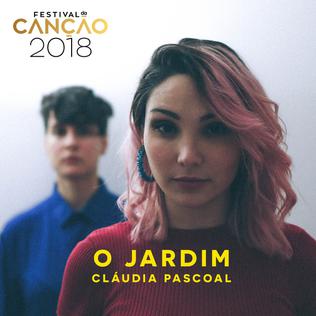
Portugal has participated in the Eurovision Song Contest 55 times since its debut at the 1964 contest. Since then it has missed five contests. The current Portuguese participant broadcaster in the contest is Rádio e Televisão de Portugal (RTP), which select its entrant with the national selection Festival da Canção. Portugal won the contest for the first time in 2017 and hosted the 2018 contest in Lisbon.

The participation of Portugal in the Junior Eurovision Song Contest first began at the Junior Eurovision Song Contest in 2006 which took place in Bucharest, Romania. Rádio e Televisão de Portugal (RTP), a member of the European Broadcasting Union (EBU), were responsible for the selection process of their participation. Portugal used a national selection format, broadcasting a show entitled "Festival da Canção Junior", for their participation at the contests. This was a junior version of Festival da Canção, the national music competition organised by broadcaster RTP to choose the Portuguese entry for the Eurovision Song Contest. The first representative to participate for the nation at the 2006 contest was Pedro Madeira with the song "Deixa-me sentir", which finished in second-last place out of fifteen participating entries, achieving a score of twenty-two points. Their worst result to date has been achieved by Rita Laranjeira with her song "Gosto de tudo " in the Junior Eurovision Song Contest 2018 where she placed 18th. Portugal withdrew from competing in 2008, and returned in 2017. They withdrew again in 2020 due to the COVID-19 pandemic. Portugal returned in 2021, where they achieved 11th place, their best result up to that point. In 2022 the country surpassed this record and reached 8th place.

Maria Teresa Villa-Lobos, known professionally as Sabrina, is a Portuguese singer from Setúbal. She represented her country and national broadcaster RTP at the Eurovision Song Contest 2007, in Helsinki, Finland, after winning the Festival da Canção, the national selection. Due to Portugal's non-qualification to the final, in 2006, Sabrina performed in the semi-final, finishing 11th thus failing to qualify.
Portugal participated in the Eurovision Song Contest 2009 with the song "Todas as ruas do amor" written by Pedro Marques and Paulo Pereira. The song was performed by the group Flor-de-Lis. The Portuguese broadcaster Rádio e Televisão de Portugal (RTP) organised the national final Festival da Canção 2009 in order to select the Portuguese entry for the 2009 contest in Moscow, Russia. The competition took place on 28 February 2009 where "Todas as ruas do amor" performed by Flor-de-Lis emerged as the winner after achieving the highest score following the combination of votes from twenty regional juries and a public televote.
Portugal participated in the Eurovision Song Contest 2010 with the song "Há dias assim" written by Augusto Madureira. The song was performed by Filipa Azevedo. The Portuguese broadcaster Rádio e Televisão de Portugal (RTP) organised the national final Festival da Canção 2010 in order to select the Portuguese entry for the 2010 contest in Oslo, Norway. After two semi-finals and a final which took place in March 2010, "Há dias assim" performed by Filipa Azevedo emerged as the winner after achieving the highest score following the combination of votes from twenty regional juries and a public televote.
Portugal participated in the Eurovision Song Contest 2011 with the song "A luta é alegria" written by Vasco Duarte and Jel. The song was performed by the group Homens da Luta. The Portuguese broadcaster Rádio e Televisão de Portugal (RTP) organised the national final Festival da Canção 2011 in order to select the Portuguese entry for the 2011 contest in Düsseldorf, Germany. The competition took place on 5 March 2011 where "A luta é alegria" performed by Homens da Luta emerged as the winner after achieving the highest score following the combination of votes from twenty regional juries and a public televote.
Portugal participated in the Eurovision Song Contest 2012 with the song "Vida minha" written by Andrej Babić and Carlos Coelho. The song was performed by Filipa Sousa. The Portuguese broadcaster Rádio e Televisão de Portugal (RTP) organised the national final Festival da Canção 2012 in order to select the Portuguese entry for the 2012 contest in Baku, Azerbaijan. The competition took place on 10 March 2012 where "Vida minha" performed by Filipa Sousa emerged as the winner after achieving the highest score following the combination of votes from twenty regional juries and a public televote.
Portugal participated in the Eurovision Song Contest 2014 with the song "Quero ser tua" written by Emanuel. The song was performed by Suzy. In November 2013, the Portuguese broadcaster Rádio e Televisão de Portugal (RTP) announced that they would be returning to the Eurovision Song Contest after a one-year absence following their withdrawal in 2013 due to financial reasons. RTP organised the national final Festival da Canção 2014 in order to select the Portuguese entry for the 2014 contest in Copenhagen, Denmark. After a semi-final and a final which took place in March 2014, "Quero ser tua" performed by Suzy emerged as the winner after gaining 41.56% of the public televote.
Portugal was represented at the Eurovision Song Contest 1998 with the song "Se eu te pudesse abraçar" written by José Cid, and performed by the group Alma Lusa. The Portuguese participating broadcaster Radiotelevisão Portuguesa (RTP) organised the national final Festival RTP da Canção 1998 in order to select its entry for the 1998 contest in Birmingham, United Kingdom. The competition took place on 7 March 1998 where "Se eu te pudesse abraçar" performed by Alma Lusa emerged as the winner following the votes from a five-member jury panel. Songwriter José Cid represented Portugal in the Eurovision Song Contest 1980 with the song "Um grande, grande amor" which placed seventh in the competition.
Portugal participated in and won the Eurovision Song Contest 2017 with the song "Amar pelos dois" written by Luísa Sobral. The song was performed by Salvador Sobral. In August 2016, the Portuguese broadcaster Rádio e Televisão de Portugal (RTP) announced that they would be returning to the Eurovision Song Contest after a one-year absence following their withdrawal in 2016 due to poor results in previous contests and the broadcaster's insufficient promotion of music-related content. RTP organised the national final Festival da Canção 2017 in order to select the Portuguese entry for the 2017 contest in Kyiv, Ukraine. After two semi-finals and a final which took place in February and March 2017, "Amar pelos dois" performed by Salvador Sobral emerged as the winner after achieving the highest score following the combination of votes from seven regional juries and a public televote.
Portugal was represented at the Eurovision Song Contest 2018 with the song "O jardim" written by Isaura, and performed by Cláudia Pascoal. The Portuguese participating broadcaster, Rádio e Televisão de Portugal (RTP), organised the national final Festival da Canção 2018 in order to select its entry for the contest. In addition, RTP was also the host broadcaster and staged the event at the Lisbon Arena in Lisbon, after winning the previous edition with the song "Amar pelos dois" performed by Salvador Sobral.

"O jardim" is a song performed by Portuguese singers Cláudia Pascoal and Isaura, which represented Portugal at the Eurovision Song Contest 2018. It premiered on 25 February 2018, when it was performed live in the second semi-final of Festival da Canção 2018, Portugal's national selection for the Eurovision Song Contest 2018. The song was released as a digital download on 9 March 2018 by Universal Music Portugal. The song features uncredited vocals from the song's lyricist, Isaura.
Portugal participated in the Eurovision Song Contest 2019 with the song "Telemóveis" written and performed by Conan Osíris. The Portuguese broadcaster Rádio e Televisão de Portugal (RTP) organised the national final Festival da Canção2019 in order to select the Portuguese entry for the 2019 contest in Tel Aviv, Israel. After two semi-finals and a final which took place in February and March 2019, "Telemóveis" performed by Conan Osíris emerged as the winner after achieving the highest score following the combination of votes from seven regional juries and a public televote.

"Telemóveis" is a song by Portuguese singer-songwriter Conan Osíris, which represented Portugal at the Eurovision Song Contest 2019 in Tel Aviv, Israel.
Portugal originally planned to participate in the Eurovision Song Contest 2020 with the song "Medo de sentir" written by Marta Carvalho. The song was performed by Elisa. The Portuguese broadcaster Rádio e Televisão de Portugal (RTP) organised the national final Festival da Canção 2020 in order to select the Portuguese entry for the 2020 contest in Rotterdam, Netherlands. After two semi-finals and a final which took place in February and March 2020, "Medo de sentir" performed by Elisa emerged as the winner after achieving the highest score following the combination of votes from seven regional juries and a public televote.
Pedro Bispo, known as simply Bispo, is a Portuguese rapper. On the 16th of January 2020, Bispo announced that he started his own record label, Mentalidade Free, signing Ivandro as his first artist. They collaborated in the song "Essa saia", which has now been streamed more than 18 million times on Spotify.
Portugal participated in the Eurovision Song Contest 2021 with the song "Love Is on My Side" written by Pedro "Tatanka" Taborda. The song was performed by the band the Black Mamba. The Portuguese broadcaster Rádio e Televisão de Portugal (RTP) organised the national final Festival da Canção 2021 in order to select the Portuguese entry for the 2021 contest in Rotterdam, Netherlands. After two semi-finals and a final which took place in February and March 2021, "Love Is on My Side" performed by the Black Mamba emerged as the winner after achieving the joint highest score following the combination of votes from seven regional juries and a public televote, winning the tiebreaker due to having more points from the latter.
Portugal participated in the Eurovision Song Contest 2022 in Turin, Italy, with "Saudade, saudade" performed by Maro. The Portuguese broadcaster Rádio e Televisão de Portugal (RTP) organised the national final Festival da Canção2022 in order to select the Portuguese entry for the 2022 contest. After two semi-finals and a final which took place in March 2022, "Saudade, saudade" performed by Maro emerged as the winner after achieving the highest score following the combination of votes from seven regional juries and a public televote.

"Saudade, saudade" is a song recorded by Portuguese singer Maro. She collaborated on the song with American musician John Blanda. It was released for digital download and streaming on 21 January 2022 via Universal Music.
Portugal was represented at the Eurovision Song Contest 2024 with the song "Grito", written by Alberto Hernández and Iolanda Costa, and performed by Iolanda herself. The Portuguese participating broadcaster, Rádio e Televisão de Portugal (RTP), organised the national final Festival da Canção 2024 in order to select its entry for the contest.





